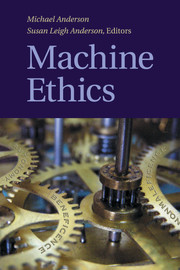Book contents
- Frontmatter
- Contents
- General Introduction
- PART I THE NATURE OF MACHINE ETHICS
- Introduction
- 1 The Nature, Importance, and Difficulty of Machine Ethics
- 2 Machine Metaethics
- 3 Ethics for Machines
- PART II THE IMPORTANCE OF MACHINE ETHICS
- PART III ISSUES CONCERNING MACHINE ETHICS
- PART IV APPROACHES TO MACHINE ETHICS
- PART V VISIONS FOR MACHINE ETHICS
- References
2 - Machine Metaethics
from PART I - THE NATURE OF MACHINE ETHICS
Published online by Cambridge University Press: 01 June 2011
- Frontmatter
- Contents
- General Introduction
- PART I THE NATURE OF MACHINE ETHICS
- Introduction
- 1 The Nature, Importance, and Difficulty of Machine Ethics
- 2 Machine Metaethics
- 3 Ethics for Machines
- PART II THE IMPORTANCE OF MACHINE ETHICS
- PART III ISSUES CONCERNING MACHINE ETHICS
- PART IV APPROACHES TO MACHINE ETHICS
- PART V VISIONS FOR MACHINE ETHICS
- References
Summary
The newly emerging field of machine ethics is concerned with ensuring that the behavior of machines toward human users is ethically acceptable. There are domains in which intelligent machines could play a significant role in improving our quality of life as long as concerns about their behavior can be overcome by ensuring that they behave ethically. Machine metaethics examines the field of machine ethics. It talks about the field, rather than doing work in it. Examples of questions that fall within machine metaethics are: How central are ethical considerations to the development of artificially intelligent agents? What is the ultimate goal of machine ethics? What does it mean to add an ethical dimension to machines? Is ethics computable? Is there a single correct ethical theory that we should try to implement? Should we expect the ethical theory we implement to be complete? That is, should we expect it to tell a machine how to act in every ethical dilemma? How important is consistency? If it is to act in an ethical manner, is it necessary to determine the moral status of the machine itself?
When does machine behavior have ethical import? How should a machine behave in a situation in which its behavior does have ethical import? Consideration of these questions should be central to the development of artificially intelligent agents that interact with humans.
Information
- Type
- Chapter
- Information
- Machine Ethics , pp. 21 - 27Publisher: Cambridge University PressPrint publication year: 2011
References
Accessibility standard: Unknown
Why this information is here
This section outlines the accessibility features of this content - including support for screen readers, full keyboard navigation and high-contrast display options. This may not be relevant for you.Accessibility Information
- 27
- Cited by
